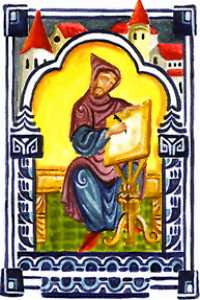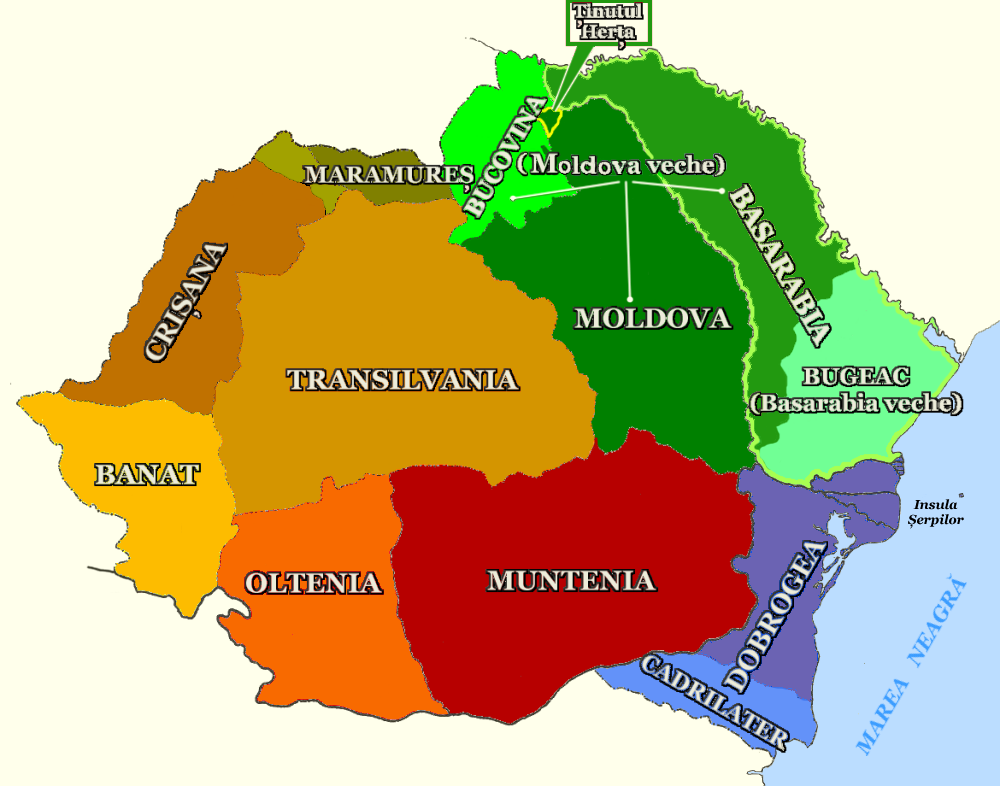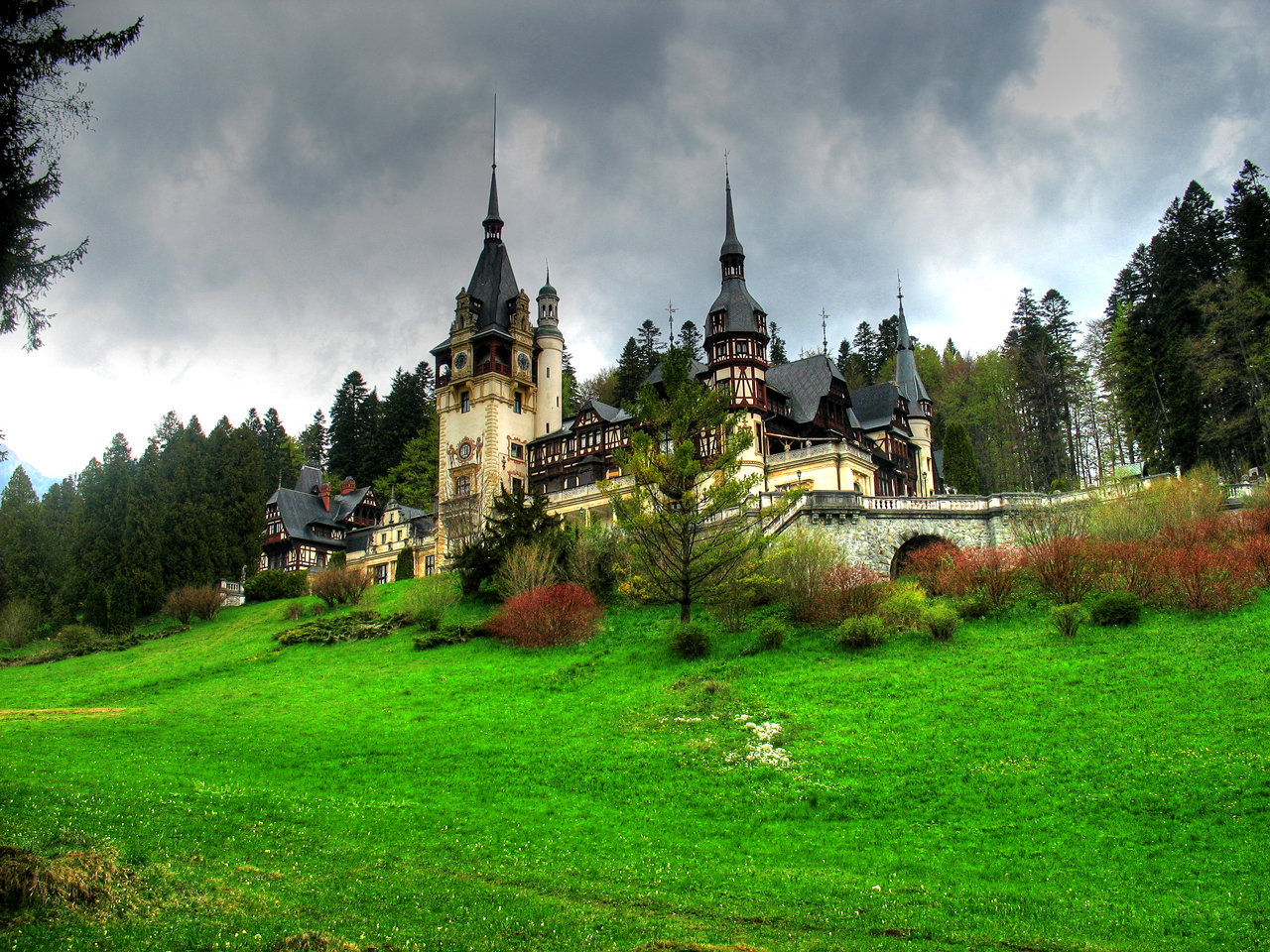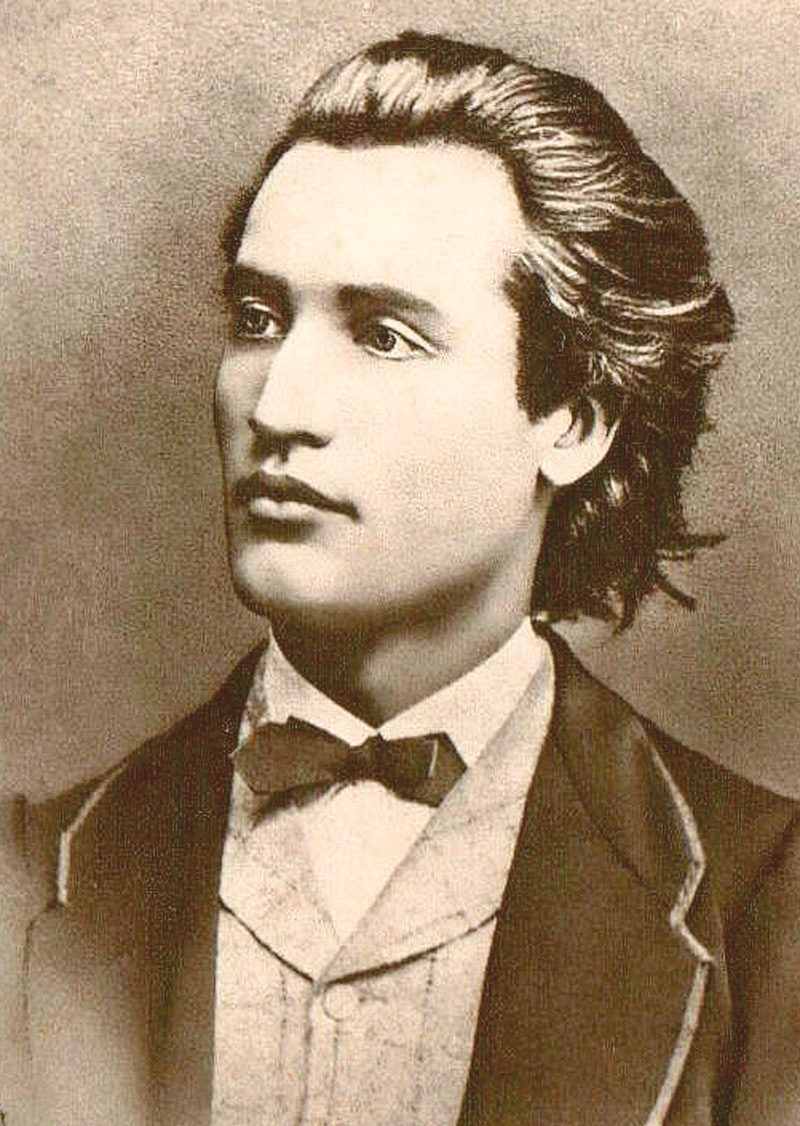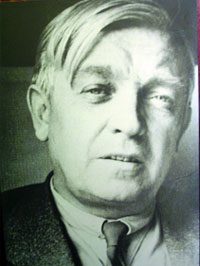 LUTHERS THESEN IN DEUTSCHER UEBERSETZUNG - 1545
LUTHERS THESEN IN DEUTSCHER UEBERSETZUNG - 1545 Aus Liebe zur Wahrheit und in dem Bestreben, diese zu ergründen, soll in Wittenberg unter dem Vorsitz des ehrwürdigen Vaters Martin Luther, Magisters der freien Künste und der heiligen Theologie sowie deren ordentlicher Professor daselbst, über die folgenden Sätze disputiert werden. Deshalb bittet er die, die nicht anwesend sein und mündlich mit uns debattieren können, dieses in Abwesenheit schriftlich zu tun.
Im Namen unseres Herrn Jesu Christi, Amen.

A unßer Meißter und HERR Jheßus Chrißtus ßpricht, Thut bußße etc. will er das das gantze leben ßeiner Gleubigen auff Erden, ein ßtete und unauffhoerliche bußße ßol ßein.
2. Und kan noch mag ßolch wort nicht vom Sacrament der bußße, das ißt, von der Beicht und Gnugthuung, ßo durch der Prießter ampt geuebet wird, verßtanden werden.
3. Jedoch wil er nicht allein verßtanden haben, die innerliche Bußße, ja die innerliche Bußße ißt nichtig, und keine Bußße, wo ßie nicht eußßerlich allerley toedtungen des fleißches wircket.
4. Wehret derhalben rew und leid, das ißt, ware Bußße, ßo lang einer misfallen an jm ßelber hat, nemlich, bis zum eingang aus dießem in das ewige Leben.
5. Der Bapßt wil noch kan nicht einige andere pein erlaßßen, außßerhalb derer, die er ßeins gefallens, oder laut der Canonum, das ißt, Bepßtlicher ßatzungen, auffgeleget hat.
6. Der Bapßt kan kein ßchuld vergeben, denn allein ßo fern, das er erklere und beßtetige, was von Gott vergeben ßey, Oder aber, das ers thu in den fellen, die er jm vorbehalten hat, welche felle, ßo ßie verachtet wuerden, bliebe die ßchuld gantz und gar unauffgehaben oder verlaßßen.
7. Gott vergibt keinem die ßchuld, den er nicht zu gleich durchaus wol gedemuetiget, dem Prießter, ßeinem Stathalter, unterwerffe.
8. Canones poenitentiales, das ißt, die Satzungen, wie man beichten und bueßßen ßol, ßind allein den Lebendigen auffgelegt, und ßollen nach laut derßelbigen ßatzungen, den jtzt Sterbenden nicht auffgelegt werden.
9. Daher thut uns der heilige Geißt wol am Bapßt, das der Bapßt alle wege in ßeinem Decreten oder Rechten, ausnimet den Artikel des todes, und die eußßerßte not.
10. Die Prießter handeln unverßtendig und ubel, die den ßterbenden Menßchen poenitentias Canonicas, das ißt, aufferlegte Bußße, ins Fegfewer, daßelbs denßelben gnug zu thun, ßparen und behalten.
11. Dießes Unkraut, das man die Bußße oder Gnugthuung, ßo durch die Canones oder Satzugen auffgelegt ißt, des Fegfewers bußße oder pein ßolte verwandeln, ißt geßeet worden, da die Bißchoue geßchlaffen haben.
12. Vorzeiten worden Canonicae poenae, das ißt, Bußße oder gnugthuung fur begangene ßuende, nicht nach, ßondern vor der Abßolution auffgelegt, dabey zu pruefen, ob die rew und leid rechtßchaffen were.
13. Die Sterbenden thun fur alles gnug durch jren tod oder abßterben, und ßind dem recht der Canonum oder Satzungen abgeßtorben, und alßo billich von derßelben aufflage entbunden.
14. Unuolkomene froemigkeit, oder unuolkomene liebe, des, der jtzt ßterben ßol, bringet notwendig großße furcht mit ßich,ja, wie viel die Liebe geringer ißt, ßo viel ißt die furcht deßte groeßßer.
15. Dieße furcht und ßchrecken ißt an jr ßelbs und allein, das ich andere ding ßchweige, dazu gnug, das ßie des Fegfewers pein und qual anrichte, dieweil ßie der angßt der verzweiuelung gantz nahe ißt.
16. Helle, Fegfewer und Himel ßcheinen gleicher mas unterßcheiden ßein, wie die rechte verzweiuelung, unuolkomene oder nahe verzweiuelung, und ßicherheit, von einander unterßchieden ßind.
17. Es ßcheinet, als mueßße im Fegfewer, gleich wie die angßt und ßchrecken an den Seelen abnimpt, Alßo auch die liebe an jnen wachßen und zunemen.
18. Es ßcheinet auch unbeweißet ßein, weder durch gute Urßachen, noch durch Schrifft, das die Seelen im Fegfewer außßer dem ßtand des verdienßts, oder des zunemens an der Lieb ßeien.
19. Es ßcheinet auch dis unerweißet ßein, Das die Seelen im Fegfewer, zum wenigßten alle, jrer ßeligkeit gewis und unbekoemmert ßeien, ob wir ßchon des gantz gewis ßind.
20. Derhalben meinet noch verßtehet der Bapßt nicht, durch dieße wort (Volkomene vergebung aller pein) das in gemein allerley pein vergeben werde, Sondern meinet die pein allein, die er ßelbs hat auffgelegt.
21. Derhalben jrren die Ablasprediger, die da ßagen, Das durch des Bapßts ablas der Menßch von aller pein los und ßelig werde.
22. Ja, der Bapßt erleßßet kein pein den Seelen im Fegfewer, die ßie hetten in dießem leben, laut der Canonum, ßollen bueßßen und bezalen.
23. Ja, ßo jrgend ein vergebung aller pein jemand kan gegeben werden, ißts gewis, das die allein den volkomeneßten,das ißt, den gar wenigen, gegeben werde.
24. Darumb mus der groeßßer teil unter den Leuten betrogen werden, durch die prechtige Verheißßung on alle unterßcheide, dem gemeinen Man eingebildet von bezalter pein.
25. Gleichen gewalt, wie der Bapßt hat uber das Fegfewer, durch aus und in gemein, So haben auch ein jeder Bißchoff und Seelßorger in ßeinem Bißthum und Pfarr, in ßonderheit, oder bey den ßeinen.
26. Der Bapßt thut ßehr wol dran, das er nicht aus gewalt des Schlueßßels (den er nicht hat) ßondern durch huelffe, oder furbitweiße, den Seelen vergebung ßchencket.
27. Die predigen Menßchentand, die da furgeben, das, ßo bald der großßchen in den kaßten geworffen, klinget, von ßtund an die Seele aus dem Fegfewer fare.
28. Das ißt gewis, als bald der Großßchen im kaßten klinget, das gewinßt und Geitz kome, zunemen und groeßßer werden, Die huelffe aber, oder die furbitt der Kirchen ßtehet allein in Gottes willen und wolgefallen.
29. Wer weis, ob auch alle Seelen im Fegfewer wollen erloeßet ßein wie man ßagt, das es mit S.Seuerino und Paßchalio ßey zugangen.
30. Niemand ißt des gewis,das er ware rew und leid gnug habe, viel weniger kan er gewis ßein, ob er volkomene vergebung der ßuenden bekomen habe.
31. Wie ßelten einer ißt, der warhafftige rew und leid hab, So ßelten ißt auch der, der warhafftig Ablas loeßet, das ißt, es ißt gar ßelten einer zu finden.
32. Die werden ßampt jren Meißtern zum Teufel faren die vermeinen durch Ablaßbrieue jrer ßeligkeit gewis zu ßein.
33. Fur denen ßol man ßich ßehr wol hueten und furßehen, die da ßagen, des Bapßts ablas ßey die höchßte und werdeßte Gottes gnade oder geßchenck, dadurch der Menßch mit Gott verßuenet wird.
34. Denn die Ablas gnade ßihet allein auff die pein der Gnugthuung welche von Menßchen auffgeßetzt ißt worden.
35. Die leren unchrißtlich, die furgeben, das die, ßo da Seelen aus dem Fegfewr, oder Beichtbrieue wollen loeßen, ßeiner rew noch leides beduerffen.
36. Ein jeder Chrißt, ßo ware rew und leid hat uber ßeinen ßuenden der hat vollige vergebung von pein und ßchuld, die jm auch ohne Ablasbrieue gehoeret.
37. Ein jeder warhafftiger Chrißt, er ßey lebendig oder tod, ißt teilhafftig aller gueter Chrißti und Kirchen, aus Gottes geßchenck, auch ohne Ablasbrieue.
38. Doch ißt des Bapßts vergebung und austeilung mit nichten zu verachten, denn, wie ich geßagt habe, ißt ßeine vergebung ein erklerung goettlicher vergebung.
39. Es ißt aus der maßßen ßchweer, auch den aller gelerteßten Theologen, zugleich den großßen reichthum des Ablas, und dagegen die ware rew und leid fur dem Volk zu rhuemen.
40. Ware rew und leid ßucht und liebet die ßtraffe, Aber die mildigkeit des Ablas entbindet von der ßtraffe, und das man jr gram wird, zum wenigßten, wenn dazu gelegenheit furfelt.
41. Furßichtiglich ßol man von dem Bepßtlichen Ablas predigen, das der gemeine Man nicht felßchlich dafur halte, das er den andern wercken der Lieb werde furgezogen oder beßßer geachtet.
42. Man ßol die Chrißten leren, das es des Bapßts gemuet und meinung nicht ßey, das Ablas loeßen jrgend einem werck der barmhertzigkeit mit jchtes ßolte zu vergleichen ßein.
43. Man ßolte die Chrißten leren, das, der dem Armen gibt, oder leihet dem Duerfftigen, beßßer thut, denn das er Ablas loeßete.
44. Denn durch das werck der Liebe wechßßt die liebe, und der Menßch wird froemer, Durch das Ablas aber wird er nicht beßßer, ßondern allein ßicherer und freier von der pein oder ßtraffe.
45. Man ßol die Chrißten leren das der, ßo ßeinen Neheßten ßihet darben, und des ungeachtet, Ablas loeßet, der loeßet nicht des Bapßts ablas, ßondern ladet auff ßich Gottes ungnade.
46. Man ßol die Chrißten leren, das ßie, wo ßie nicht ubrig reich ßind, ßchueldig ßind, was zur notdurfft gehoeret, fur jr Haus zu behalten, und mit nichten fur Ablas zu verßchwenden.
47. Man ßol die Chrißten leren, das das Ablas loeßen ein frey ding ßey, und nicht geboten.
48. Man ßol die Chrißten leren, das der Bapßt, wie mehr er eines andechtigen Gebets bedarff, Alßo deßßelben mehr begere, denn des gelts, wenn er Ablas austeilet.
49. Man ßol die Chrißten leren, Das des Bapßts ablas gut ßey, ßo fern man ßein vertrawen nicht drauff ßetzet, Dagegen aber nichts ßchedlichers, denn ßo man dadurch Gottes furcht verleuret.
50. Man ßol die Chrißten leren, Das der Bapßts, ßo er wueßte der Ablasprediger ßchinderey, lieber wolte, das S.Peters Muenßter zu puluer verbrand wuerde, denn das es ßolt mit haut, fleißch und bein ßeiner Schaffe erbawet werden.
51. Man ßol die Chrißten leren, das der Bapßt, wie er ßchueldig ißt, alßo auch ßeines eigen gelds, wenn auch ßchon S.Peters Muenßter dazu ßolte verkaufft werden, den Leuten austeilen wuerde, welche doch etliche Ablasprediger jtzund ßelbs umbs geld bringen.
52. Durch Ablasbrieue vertrawen ßelig zu werden, ißt nichtig und erlogen ding, ob gleich der Commißßarius (oder Ablas vogt) ja der Bapßt ßelbs, ßeine Seele dafur zu pfand wolt ßetzen.
53. Das ßind feinde Chrißti und des Bapßts, die von wegen der Ablaspredigt, das wort Gottes in andern Kirchen zupredigen ganz und gar verbieten.
54. Es geßchiet dem wort Gottes unrecht, wenn man in einer Predigt gleich ßo viel oder mehr zeit auffwendet das Ablas zu verkuendigen als auff das wort Gottes.
55. Des Bapßts meinung kan nicht anders ßein, denn ßo man das Ablas (das das geringßte ißt) mit einer glocken, einem gepreng und ceremonien begehet, das man dagegen und viel mehr das Euangelium (welchs das groeßßt ißt) mit hundert Glocken, hundert gepreng, und Ceremonien ehren und preißen ßolle.
56. Die ßchetze der Kirchen, dauon der Bapßt das Ablas austeilet, ßind weder gnugßam genand noch bekand, bey der gemein Chrißti.
57. Denn das es nicht leibliche zeitliche Gueter ßind, ißt daher offenbar das viel Prediger dießelben nicht ßo leichtlich hingeben, ßondern allein auff ßamlen.
58. Es ßind auch nicht die verdienßt Chrißti und der Heiligen, Denn dieße wircken alle zeit, on zuthun des Bapßts, gnad des innerlichen Menßchen, und das Creutz, Tod und Helle, des eußßerlichen Menßchen.
59. S.Laurentius hat die Armen, ßo der Kirchen glieder ßind genant die Schetze der Kirchen, Aber er hat das woertlin genomen, wie es zu ßeiner zeit im brauch war.
60. Wir fragen aus gutem grund, on freuel oder leichtfertigkeit, das dießer ßchatz ßeien die Schlueßßel der Kirchen, durch das verdienßt Chrißti der Kirchen geßchencket.
61. Denn es ißt klar, das zu vergebung der pein, und vorbehaltener Felle, allein des Bapßts gewalt gnug ißt.
62. Der rechte ware ßchatz der Kirchen ißt das heilige Euangelium der herrligkeit und gnaden Gottes.
63. Dießer Schatz ißt billich der allerfeindßeligßte und verhaßßeßte, Denn er macht, das die erßten die letzten werden.
64. Aber der Ablas ßchatz ißt billich der aller angemeßte, Denn er macht aus den letzten die erßten.
65. Derhalben ßind die ßchetze des Euangelij, netze, da man vor zeiten die Reichen wolhabende Leute mit gefißchet hat.
66. Die ßchetze aber des Ablas ßind netze, damit man jtziger zeit die reichthum der Menßchen fißchet.
67. Das Ablas, das die Prediger fur die groeßßeßte gnad ausruffen, ißt freilich fur großße gnad zu halten, denn es großßen gewinßt und genies treget.
68. Und ißt doch ßolch Ablas warhafftig die allergeringßte gnade, wenn mans gegen der gnaden Gottes, und des Creutzes gottßeligkeit helt oder vergleichet.
69. Es ßind die Bißchoue und Seelßorger ßchueldig, des Apoßtolißchen Ablas Commißßarien mit aller ehrerbietung zu zulaßßen.
70. Aber viel mehr ßind die ßchueldig mit augen und ohren auff zu ßehen, das dießelben Commißßarien nicht an ßtat Bepßtliches befehls, jre eigen trewme predigen.
71. Wer wider die warheit des Bepßtlißchen Ablas redet, der ßey ein Fluch und vermaledeiet.
72. Wer aber wider des Ablas predigers mutwillige und freche wort ßorge tragt, oder ßich bekuemmert, der ßey gebenedeiet.
73. Wie der Bapßt die jenigen billich mit ungnad und dem Bann ßchlegt die zu nachteil dem Ablas jrgend auff einigem weg handlen.
74. So viel mehr trachtet er auff die Leute ungnad und Bann zu ßchuetten, die unter dem ßchein des Ablas, zu nachteil der heiligen Lieb und Warheit handeln.
75. Des Bapßts Ablas ßo großß halten, das er einen abßoluiren oder von ßuenden los machen koenne, wenn er gleich (unmueglicher weiße zu reden) die mutter Gottes geßchwechet hette, ißt raßend und unßinnig ßein.
76. Dagegen ßagen wir, das des Bapßts Ablas nicht die allergering ßte tegliche ßuende koenne hinweg nemen, ßo viel die ßchuld derßelben belanget.
77. Das man ßaget, S.Peter, wenn er jtzt Bapßt were, vermoechte nicht groeßßern Ablas zu geben, ißt ein leßterung wider S.Peter und den Bapßt.
78. Dawider ßagen wir, Das auch dießer und ein jeder Bapßt groeßßern Ablas hat, nemlich, das Euangelium, Kreffte, gaben geßund zu machen etc. 1. Corinth. 12.
79. Sagen, das das Creutz mit des Bapßts wapen herrlich auffgericht, vermoege ßo viel als das Creutz Chrißti, ißt eine Gottesleßterung.
80. Die Bißchoue, Seelßorger und Theologen, die da geßtatten, das man ßolche wort fur dem gemeinen Man reden darff, werden rechenßchafft dafur mueßßen geben.
81. Solche freche und unuerßchempte Predigt und rhum vom Ablas, macht, das es auch den Gelerten ßchweer wird, des Bapßts ehre und wirde zu verteidigen, fur derßelben verleumbdung, oder ja fur den ßcharffen lißtigen des gemeinen Mans fragen.
82. Als nemlich, Warumb entlediget der Bapßt nicht alle Seelen zu gleich aus dem Fegfewr umb der allerheiligßten Liebe willen, und von wegen der hoechßten not der Seelen, als der allerbillichßten urßachen, So er doch umb das allervergenglichßten gelts willen, zu baw S.Peters Muenßter, unzelich viel ßeelen erloeßet, als von wegen der loeßeßten urßachen?
83. Item, Warumb bleiben die begengnis und jarzeit der Verßtorbenen ßtehen, und warumb gibt er nicht wider, oder vergoennet wider zu nemen die Beneficia oder Pfruenden, die den Todten zu gut geßtifftet ßind, So es nu mehr unrecht ißt, fur die Erloeßeten zu beten ?
84. Item, Was ißt das fur eine newe heiligkeit Gottes und des Bapßts, das ßie den Gottloßen und dem Fremde, umb gelds willen verguennen ein Gottfuerchtige und von Gott geliebte Seele zu erloeßen, und wollen doch nicht viel mehr umb der großßen not derßelben Gottfuerchtigen und geliebten Seelen willen, ßie aus lieb umb ßonßt erloeßen ?
85. Item, Warumb die Canones poenitentiales, das ißt, die ßatzunge von der Bußße, nu langeßt in jnen ßelbs mit der that, ob ßie ßchon noch im gebrauch ßind, abgethan und tod, noch mit geld geloeßet werden, durch gunßt des Ablas, als weren ßie noch gantz krefftig und lebendig ?
86. Item, Warumb bawet jtzt der Bapßt nicht lieber S.Peters Muenßter, von ßeinem eigenem gelde, denn von der armen Chrißten geld, weil doch ßein vermoegen ßich hoeher erßtreckt, denn keines reichen Craßßi gueter ?
87. Item, Was erloeßet oder teilet der Bapßt ßein Ablas denen mit, die ßchon durch volkomene rew einer volkomenen vergebung und Ablas berechtigt ßind ?
88. Item, Was kuend der Kirchen mehr guts widerfaren denn wenn der Bapßt, wie ers nur ein mal thut, alßo hundert mal im tage jedem Gleubigen dieße vergebung und Ablas ßchencket ?
89. Weil auch der Bapßt der Seelen ßeligkeit mehr durch Ablas denn durchs Gelt ßuchet, Warumb hebt er denn auff, und macht zu nicht die brieue und Ablas die er vormals gegeben hat ßo ßie doch gleich krefftig ßind ?
90. Dieße der Leyen ßehr ßpitzige Argument, allein mit gewalt wollen dempffen, und nicht durch angezeigten Grund und Urßach auffloeßen, heißßt die Kirche und Bapßt denn Feinden zu verlachen darßtellen, und die Chrißten unßelig machen.
91. Derhalben, ßo das Ablas nach des Bapßts geißt und meinung gepredigt wuerde, weren dieße Einreden leichtlich zu verantworten ja ßie weren nie nicht furgefallen.
92. Muegen derhalben alle die Prediger hinfaren, die da ßagen zu der gemeine Chrißti, Fried, Friede und ißt kein fried.
93. Denen Predigern aber müßße es allein wol gehen, die da ßagen zur gemein Chrißti, Creutz, Creutz, und ißt kein Creutz.
94. Man ßoll die Chrißten vermanen, das ßie jrem Heubt, Chrißto, durch Creutz, tod und Helle nach zu folgen ßich bevleißßigen.
95. Und alßo mehr durch viel truebßal ins Himmelreich zu gehen, Denn das ßie durch vertroeßtung des friedes ßicher werden.
